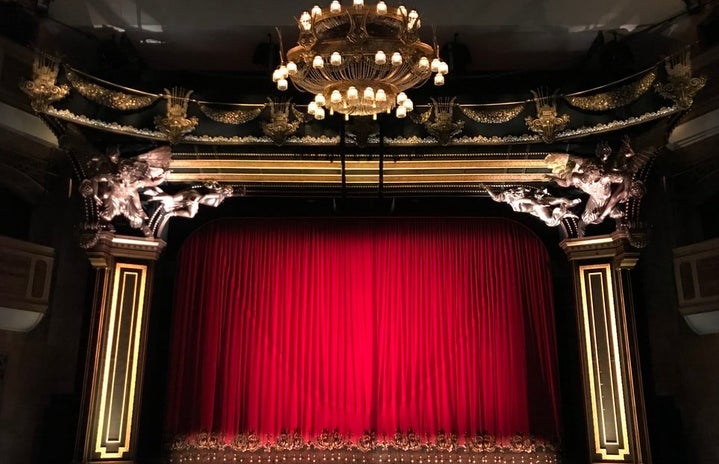Othello is maybe my favourite of Shakespeare’s tragedies. It has an interesting tragic hero and the best villain, and its themes appear to shift depending on the context of the time it is on stage. For those not familiar with the story, I will give a quick overview. Our main character, Othello, is described as ‘The Moor’ and in most adaptations he is portrayed as a black man. In the play, he marries the white Desdemona. Whilst this is going on, Othello, who has risen to the high ranks of the army, appoints Cassio as his right-hand man, which another character and our villain, Iago, seemingly takes huge issue with. The end of the play sees characters completely changed, many dead, and not all questions answered. In the current interpretation which is playing at the Sam Wanamaker Playhouse at Shakespeare’s Globe, they have made a few decisive changes to the story, some of which I like and some of which I take issue with.
From now there are going to be a lot of spoilers so take heed if you do not want to know!
The whole cast was incredible, particularly Emilia, despite having less scenes than most of the main characters. Othello too was a stand out performance, which is potentially difficult as despite Othello being the titular character, he is more of a secondary character to Iago. However, this interpretation chose to give Othello a double which only the audience can see. This was, in my opinion, the greatest addition to the play. Othello is a distant character, as we only hear one soliloquy from him which is sparse in comparison to other Shakespearean tragic heroes. The double allows us access to his interior thought process, whilst in the original we must guess at what Othello is truly feeling. However, you could argue that this removes the ambiguity of his character which I believe is part of the reason for our continual interest in this story.
The Sam Wanamaker Playhouse is also a very small and intimate setting, and this really enhanced the tragic themes of the play. They seemed to revel in the tension they were creating. This was never more so than when they would change the lighting of the scene. The stage is lit mostly with candles and throughout the play the actors will light them and put them out which takes a few minutes every time. Their control of the atmosphere of the theatre creates tensions which accumulates to the climax at the end of the play when Othello lights each candle that surrounds the bed on which Desdemona lies and will subsequently be murdered on. I sat there, unable to breathe, despite knowing this play inside out.
Moving on to my more ambivalent feelings. This interpretation chose to set the play within the metropolitan police force in London instead of in Venice and Cyprus. This was interesting for many reasons but mainly because the military themes are important in the original play, and this translates nicely into a modern setting. However, it also significantly speaks to the current knowledge of and problems with the police. We as a modern audience are arguably aware of the issues and corruption within the police force that are systemic and ongoing and have been on the public conscious recently. Because of this I understand why they chose to end the play like they did but it is also the reason I cannot fully support this interpretation. Here are major spoilers! Othello does not die. I simply cannot get behind this. We do not get the entirety of his final speech and there is less of a discussion about whether he is a tragic hero or not. All the nuance which makes this play interesting and eternal, have been removed for, in my opinion, a clunky attempt at social commentary. Instead, Othello and Iago are arrested, and Iago is presented as having mental health issues whilst Othello is villainised because of his race. This is in keeping with some elements of the original, however, I think Othello is robbed of some of his agency at the end, his moment to choose whether he lives or dies.
Shakespeare wrote revolutionary plays which a lot of the time appear incredibly forward thinking, but he also was writing throughout the 16th and 17th centuries and therefore it will not always align with modern thinking. However, I think we forget that just because Shakespeare wrote something for a character to say does not mean these thoughts or comments represented his own values. A character can be a mouthpiece for something or symbolise something greater than itself. Which is why most modern portrayals of Desdemona will always irritate me. Desdemona and Emilia are foil characters which means they as characters work as opposites. Desdemona cannot be this outspoken and headstrong character as she is not written that way. I do not mind some exaggeration and attempts to make her more likable to a modern audience, however, I have noticed in most productions, Desdemona’s last lines are cut. In the play Emilia walks in after Othello has killed Desdemona, who is not quite dead yet, and in response to Emilia asking who did this she says, “Nobody, I myself. Farewell. / Commend me to my kind lord. O, farewell”. In my opinion, this is vital to understanding her character. At the very end she is still loyal to Othello and to God. She cannot be swayed by revenge or jealousy like the other characters in this play which is one of the reasons there is so much pathos at her death; it truly is an unjust murder. I believe by the removal of these lines we are projecting our own desires of how we want a woman to behave. We want her to not defend the man who has done this, but that is not what Shakespeare wrote, we are simplifying a story instead of allowing interesting conversations about Desdemona’s purpose in this play.
This was truly an experience of two halves. With everything I loved there was another thing I didn’t. However, the essence of this interpretation was innovative whilst remaining loyal to the source material. However, I do not think this is necessarily a problem with this adaptation. Othello as a character is one of two halves, he literally changes within one scene, and he is arguably of two races. He is, as Ben Okri said, ‘the white man’s myth of a black man’, and because of this, modern audiences are uncomfortable. But maybe tragedy should make us feel uncomfortable because it is happening in the safety of a theatre through the vessel of art. Art can be complicated and reflect the chaotic nature of life. It is difficult to navigate social issues because we are not stock characters, we all contain multitudes. Othello as a tragic hero does not fit the mould, partially because of his race and partially because he is so distant. This adaptation does a brilliant job of bridging that gap, but perhaps at the cost of nuance and subtlety.
SUICIDE: If you or someone you know is experiencing suicidal thoughts, call Samaritans for free on 116123 or by emailing jo@samaritans.org. You can also contact SHOUT, a confidential 24/7 text service, on 85258, Papyrus Hopeline UK, a confidential suicide prevention service, on +44-08000684141, or Nightline, a confidential, anonymous listening service for students, through their website https://nightline.org.uk/. You can also call Switchboard, a listening service for and operated by LGBT+ people, on 0300 330 0630.


